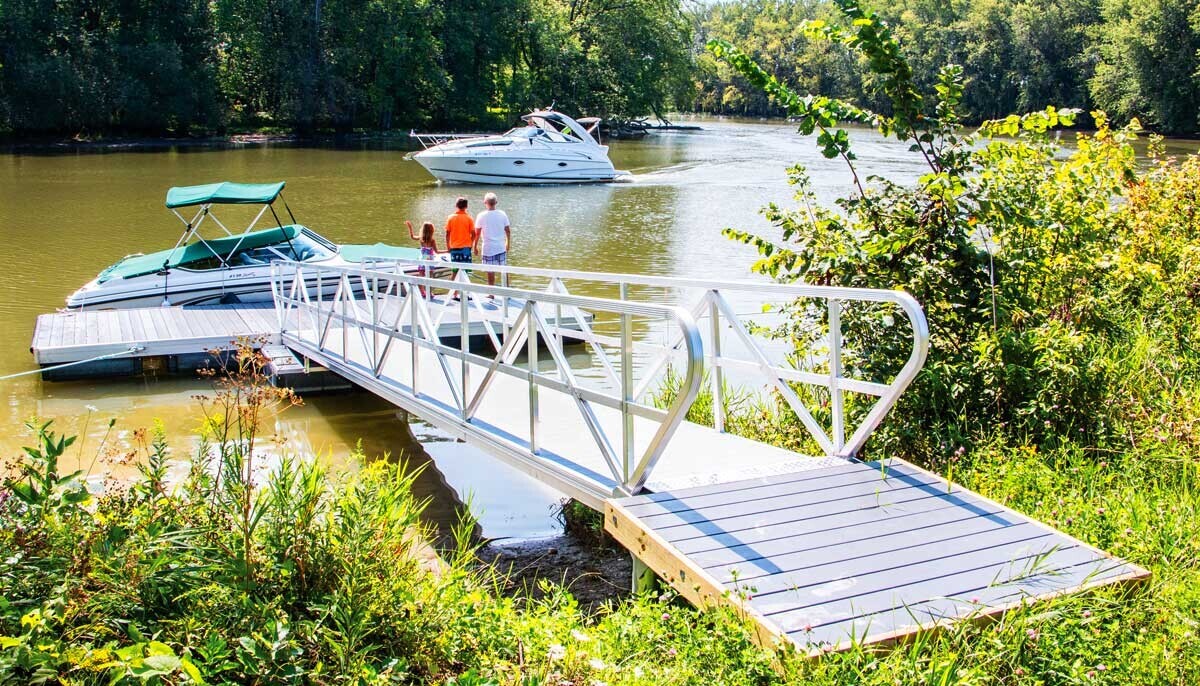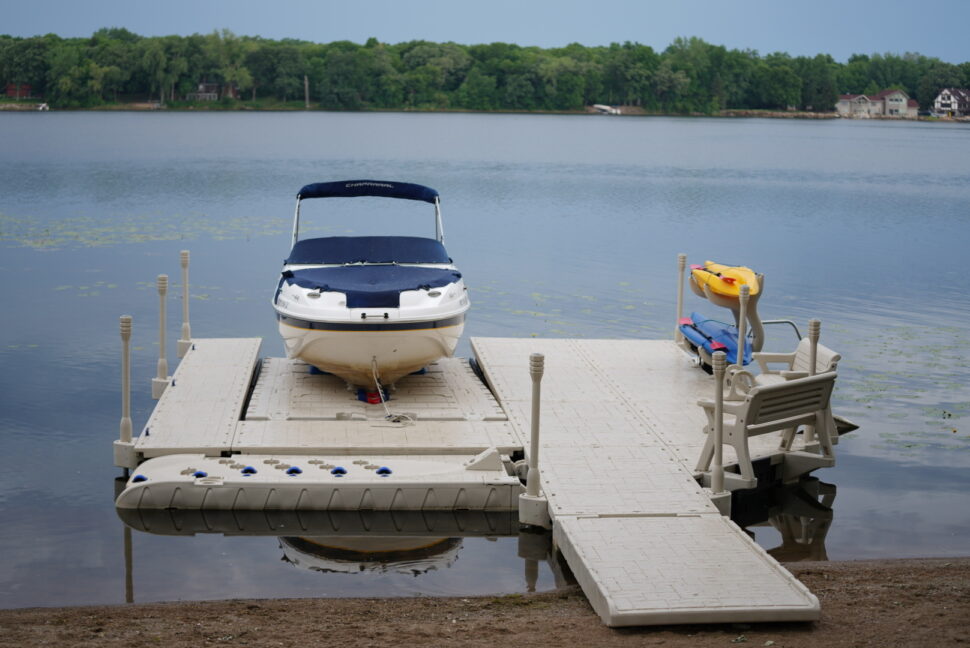The Importance of Quality in Floating Dock Builder Option for Long-Lasting Docks
The Importance of Quality in Floating Dock Builder Option for Long-Lasting Docks
Blog Article
The Ultimate Overview to Choosing the very best Floating Docks
Choosing the excellent floating dock calls for a thorough understanding of various components that affect both performance and durability. Variables such as dock types, materials, and important features substantially influence your decision-making process.
Comprehending Floating Dock Kind
When selecting a drifting dock, it is necessary to understand the different kinds readily available, as each serves distinct objectives and applications. Floating docks primarily come under three groups: modular, fixed, and pontoon docks.
Modular docks are made up of private sections that can be conveniently constructed or reconfigured, making them ideal for transforming water degrees and varied usages, such as business operations or leisure activities. Their versatility allows for modification based upon particular requirements.

Pontoon docks are identified by their buoyant framework, frequently composed of several pontoons that supply stability and support. They are especially well-suited for bigger vessels and are typically used in marinas or for beachfront buildings. Comprehending these types help in picking one of the most ideal floating dock to fulfill specific requirements, guaranteeing ideal capability and safety.
Secret Materials for Durability
Picking the appropriate materials for floating docks dramatically effects their sturdiness and long life. One of the most typical materials consist of wood, plastic, steel, and composite materials, each offering distinctive advantages and constraints.
Wood, usually preferred for its aesthetic appeal, calls for routine maintenance to hold up against dampness and degeneration. Pressure-treated lumber can boost resistance to rot, however it may still be prone to bugs and weathering.

Plastic docks, made from high-density polyethylene (HDPE), are resistant to deterioration, UV radiation, and impact, making them a preferred option for coastal settings. Their lightweight nature also helps with simple installment and moving.
Steel docks, normally created from aluminum or galvanized steel, give outstanding stamina and resilience. They are immune to deterioration, especially when treated, but might require added insulation to stop warm buildup in warm environments.
Composite products, integrating timber fibers and plastics, supply the advantages of both wood and plastic, standing up to wetness and fading while needing marginal maintenance. - floating dock builder
Inevitably, the option of products must line up with ecological problems, meant use, and maintenance preferences to make sure the floating dock continues to be practical and visually pleasing in time.
Necessary Functions to Take Into Consideration
While the selection of materials is essential, thinking about essential attributes for floating docks is just as important to ensure optimal performance and user satisfaction. One key attribute to examine is the dock's buoyancy capacity, which figures out how much weight it can sustain without immersing. floating dock services. This is vital for fitting watercrafts, individual boat, and even recreational activities
Additionally, mobility is a substantial factor to consider. Relying on your needs, you may desire a dock that is very easy to take apart and transfer, specifically if you plan to transfer it seasonally. Security is another essential attribute; a properly designed floating dock should lessen activity triggered by wind and water currents, supplying a Clicking Here secure platform for customers.
Safety and security functions, such as non-slip surfaces and rounded sides, are also important to stop crashes, specifically in damp conditions. Additionally, think about the availability of devices, such as cleats, bumpers, and ladders, which can improve the capability of your dock.
Setup and Maintenance Tips
Setting up and preserving a floating dock requires careful planning and focus to information to ensure its long life and optimum performance. Begin by picking a proper place that minimizes direct exposure to strong currents and waves, which can cause this contact form deterioration. Guarantee that the water deepness suffices for the dock's height which it is anchored firmly to stop movement.
During installation, follow the supplier's standards carefully, as inappropriate setting up can endanger stability. Usage high-grade materials immune to corrosion, such as aluminum or treated wood, to enhance durability. On a regular basis examine all elements, consisting of floats, connectors, and securing systems, for indicators of damages or wear.
If your dock makes use of flotation protection devices, guarantee they remain undamaged and free from slits. By sticking to these setup and maintenance tips, you can delight in a reputable and useful floating dock for years to come.
Budgeting for Your Dock
Budgeting for your dock is a crucial action that can substantially influence your general satisfaction and investment in a waterfront residential property. Establishing a clear spending plan assists you navigate the various choices readily available and ensures you make educated choices that straighten with your economic capabilities.
Begin by determining the dimension and layout of the dock you call for, as these factors will considerably affect the cost. Floating docks can differ substantially in cost, relying on materials, buoyancy, and features like devices and ramps. Research study various makers and providers to compare rates and comprehend the market value.
Along with preliminary prices, take into consideration ongoing expenses such as maintenance, insurance policy, and prospective repair services. Allot funds for these recurring expenses to avoid surprises down the line. It's also prudent to allocate any kind of required permits or inspections, which might be required by regional guidelines.
Lastly, bear in mind the possible roi. A well-planned dock can boost your property's worth and charm, offering a positive monetary impact in the long-term. By budgeting effectively, you can make sure that your dock meets your needs without endangering your economic stability.
Final Thought
To conclude, selecting the perfect floating dock demands a comprehensive assessment of various elements, consisting of dock kinds, materials, important attributes, and setup procedures. Prioritizing longevity and compliance with local regulations inevitably improves performance and residential or commercial property value. Mindful factor to consider of financial constraints will certainly further make sure an Get More Information audio financial investment. By sticking to these guidelines, individuals can make educated decisions that promote long-lasting satisfaction and usability in aquatic atmospheres.

While the choice of products is essential, thinking about essential features for floating docks is just as vital to ensure ideal efficiency and customer contentment.Setting up and preserving a floating dock requires careful preparation and interest to information to guarantee its longevity and optimal performance. Floating docks can differ substantially in cost, depending on materials, buoyancy, and features like ramps and devices.In final thought, selecting the suitable floating dock necessitates a complete evaluation of various elements, including dock types, products, necessary functions, and installation processes.
Report this page